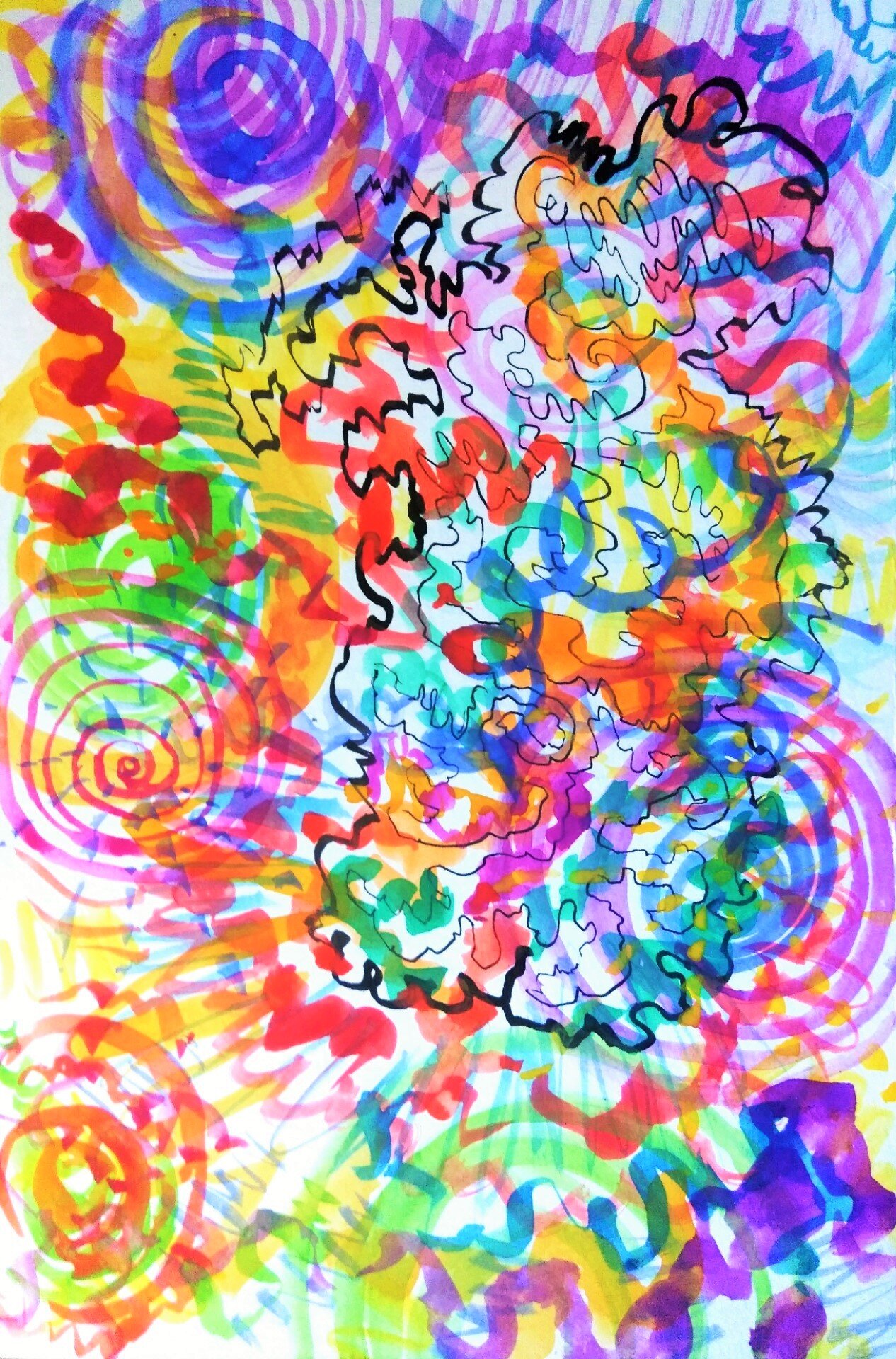Reflection and Artwork by Sebila Kratovac
My confidence as an artist and my self-worth as a human being has been tested many times in my life but a memory from my eleventh-grade art class comes to mind very vividly. In high school, art classes were my only refuge from feeling like an alien in the American Deep South. I loved drawing, painting, and sculpting and remember only feeling joyful in art classes. In this particular art class however, I had a teacher who very much disliked my art. Despite not being supported by this teacher, I decided to enter a high school art competition that year. The teacher was shocked and displeased when my painting received an honorable mention. This happened to me again in graduate school for science, where I was discouraged and unsupported by my “advisors” but I still continued to go forward and eventually got great feedback from other people who were more receptive to what I was trying to do.
So many of us hear our calling to create – an urge which is deeply connected to our joy and soul purpose. It can be heartbreaking to discover that others don’t recognize our great potential and passion for what we want to do. In a recent episode of her podcast Magic Lessons called "Who Gets To Decide Whether You're A Legitimate Artist?", Elizabeth Gilbert interviews Cecilia, a young poet whose love for poetry was tested when she tried to apply for MFA programs in poetry. Despite writing poetry from youth and loving the process, Cecilia stopped writing after all the schools she applied to didn’t admit her. She felt absolutely crushed and conflicted because she saw herself as a talented poet while the “experts” didn’t feel the same way. How was she to trust herself ever again? Luckily, Gilbert, a writer of the beloved book Eat, Pray, Love, who went through her fair share of criticism, gave Cecilia some great advice on how to continue committing to her craft.
First, Gilbert compassionately reminded the young poet that she doesn’t need anyone’s permission to do what she loves – no teacher, no “expert”, no parents, no friends, no one but herself. She gave Cecilia an assignment to create her own diploma so that she can give herself permission to continue writing poetry and to think of herself as a poet. To me, the handmade diploma is a symbol for our faith in ourselves and commitment to staying true to what lights us up. Many now-famous artists and writers have had to overcome ridicule and constant rejections. Gilbert’s second guest, poet and spiritual adviser Mark Depo, gives a striking example of the celebrated American author Herman Melville. When Melville presented his book Moby Dick to the world, he was laughed at, shamed, and banished from his writing community. Melville even stopped writing for a while. Today, Moby Dick is considered by many as a masterpiece and one of the greatest books of all time. The impressionistic painter Vincent van Gogh found himself in a very similar situation. Despite being rejected by his peers and never selling a painting in his lifetime, he continued to paint passionately until his death. Nowadays, he is one of the most revered and loved painters because people from all walks of life recognize something very special about his art. No critic can take the magic away from what he created. Gilbert goes on to highlight the importance of looking into history to feel that we are a part of a larger and timeless network of creative people that went through the same struggles but persevered.
In essence, the experience we go through when we are rejected is a path of self-acceptance and of living a life we desire despite all outside forces telling us otherwise. The final advice that Gilbert gives Cecilia is to focus on writing her poetry without the pressure of putting her work out there for one full year. This advice may seem counter-intuitive or even crazy but when we are not pressured to put out artwork that gets likes on social media or approval from critics, we finally may be able to let go of resistance enough to start creating what we want. Even seeing that we are more productive can improve our self-esteem. The bonus comes when we realize that we have accomplished what we never thought we could and that we created work we are really proud of. From this empowered state, putting our work out there when we are ready might not feel as scary since our worth would no longer be tied to what others say about our art. In Cecilia’s case, there are many reasons why she wasn’t admitted into graduate school including that it just wasn’t the right time for her. She could have been scared to send in her most-cherished poems because of her need to fit in. Now that she can have time and space to work on her poetry and strengthen her confidence, she may not even feel compelled to go to graduate school after all. Situations that to us seem crushing, can teach us to believe in our own worth and to project this confidence into the world, releasing our dependence on the outside world to tell us who we should be.
I wonder what compelled me to defy my art teacher and believe in myself enough to enter the high school art competition. Maybe it was my rebellious nature which loves to prove wrong those who think that there is the right way to create art, or possibly my intuitive knowing that art is my calling, that gave me the courage to stand up for myself. The golden thread that I see running through Cecilia’s and my own life experience is the necessity to stick to doing what we love and what sounds true to us. Through committing to our truth, we can develop unshakable confidence, even if it is at first a symptom of our defiance. As we embody confidence, we can attract other people to us who truly appreciate what we do. We are then supported for who we are, not for what others expect from us. I am reminded of one of my favorite artists, Kate Bush, who decided to introduce herself to the world with the song Wuthering Heights. Everyone in the music industry said that the song would end her career before it started. She could have debuted with a pop song but she knew that she wouldn’t be speaking to an audience that would support her authentic self. Wuthering Heights, as strange and alien as it was to untrained ears used to pop music, became Bush’s most iconic song and inspired many artists in the 80s and beyond to embrace the unusual.


